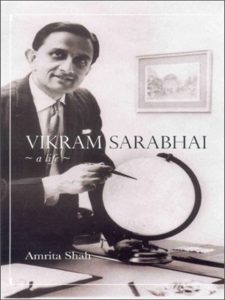
Publisher: Viking (India)ISBN-10: 0670999512
ISBN-13: 978-0670999514, Hardcover: 264 pages
Although, any national space programme relies on thousands of individuals, history has a tendency to single out one man (and it usually is a man) as an originator above all others. Sergei Korolev and perhaps Wernher von Braun served that role for the Soviet Union and the USA respectively, for India it was Vikram Sarabhai. Although my interest was in his contribution to the Indian space program, this book is not about the Indian space program but about Sarabhai’s eventful and productive albeit short life.
Why is it that he is accepted throughout India as the father of the Indian space programme? How was he able to move so freely between his aristocratic roots, pursue space projects to assist the poor, interacted with powerful political figures and scientists of international repute, are some of the questions the author addresses in this book.
Using national archives throughout India and first hand accounts from those who knew and worked with him, this is currently the definitive work covering his personal and his professional life. The author is not a scientist but a journalist with a diverse portfolio of work including a pioneering series of articles about the Mumbai underworld, captures the nuances of Sarabhai’s personal life that perhaps a scientist would not. Especially the complex but open relationship he had with his wife and mistress. The author met and recorded testimony from both.
The book covers the established Sarabhai family’s success in business and industry in to which Vikram is born it then traces his education at home and in Cambridge. The Sarabhai family was well connected with some of the influential figures in politics, science and the arts, like Mahatma Gandhi, Rabindranath Tagore, Jawaharlal Neru and CV Raman. This at a time before they became the profound historical figures they are now. Vikram is clearly intellectually gifted but the book records how he also makes use of these connections in developing his career. For example he takes a letter of introduction from Rabindranath Tagore on his first trip to Cambridge. Not only was Tagore the first non European to win the Nobel Prize for literature but he was also a family friend.
Taking charge of the Atomic Energy Commission following the unexpected death of Homi Bhabha who believed that India should have its own nuclear deterrent, Sarabhai worked consistently on shifting India’s focus towards peaceful uses of nuclear energy. The book also contains interesting snip-its that reflects the easy going aspects of his character. For example whilst attending the International Atomic Energy Authority meeting in Vienna, Vikram organised, probably the most audacious Indian Takeaway – an Indian meal for the delegates delivered from Bombay to Vienna via an Air India Airways flight on the final day of the conference.
The author never met Sarabhai but develops an intricate personal profile from those who did. Sarabhai was a workaholic. Not only was he overwhelmingly optimistic in his vision of how India could prosper through science and technology but he conveyed that optimism to all who worked with him.
This book was published in 2007. As time passes, fewer of those who new him personally remain. Surprisingly, this is the only comprehensive biography and not being available as an ebook format, is not easy to get outside India.
Leave a Reply